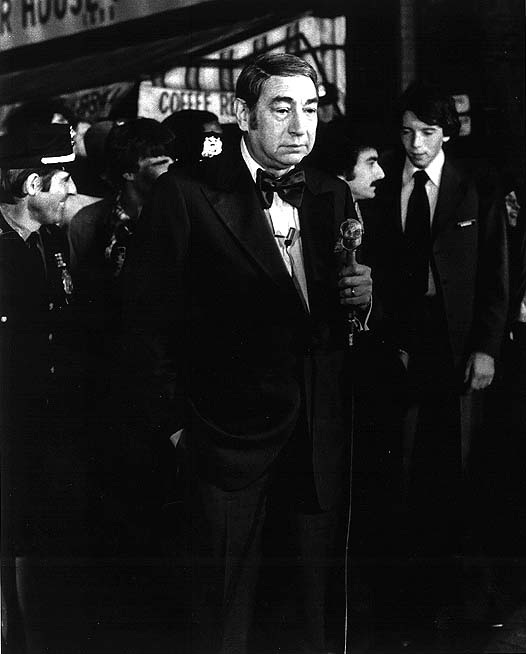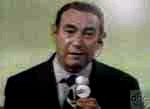The following story is a tribute to Howard
Cosell, written by Don Kimberlin,
a long time broadcaster and
telecommunications engineer.
Telling It Like It Was
by Donald E. Kimberlin
April 27, 1995
I can't say, "I knew Howard Cosell before he was Howard Cosell," because I wasn't around in 1918 when he was born Howard William Cohen in Winston-Salem, North Carolina. Nor was I even aware of him when changed his name to Cosell in his college years. He did, though, come to my awareness in the 1950's. Little did it seem that a whole nation and much of the world would become aware of him. Much less did I realize at the time, or even for a decade or two later realize what important change he brought to journalism and broadcasting.
It was the 1950's, but it was not yet the 1950's. One of my college favorites taught me that. He was an old history professor who loved lecturing for hours on end. I thought I was beating the system, since he ran evening class sessions lasting four hours, so you could finish his courses in six weeks instead of a semester. Little did I know he required all the reading and written work in six weeks, too.
But, he made the lecture sessions supremely enjoyable. One of his lectures really stuck with me, too. It was on his thesis that a "decade" in history did not begin with the turn of a calendar -- that it always took half a decade before signs of change were recorded. He proceeded to prove his point with events throughout history showing how our recollection of a "decade" really begins notable events midway through that decade. Think on it and you'll realize he was correct.
When Howard Cosell appeared to my notice, it really still was the 1940's. If there were women like Leona Helmsley, they operated quietly, so nobody knew it. Rock 'n roll hadn't shown up yet, much less Elvis. Radio stations were still playing Big Band music, Sousa marches, and romantic vocals by Tony Martin or Frank Sinatra or Patti Page or Jo Stafford. Arthur Godfrey and His Friends were still Big Time Stuff, as was Don McNeill's Breakfast Club with Aunt Fannie (who others would know as the "Fran" of Kukla, Fran and Ollie). And sportscasters had one stock in trade -- outright adulation of star athletes. Nobody had warts; every sport was clean as the wind-driven snow -- or so it was reported. Then a raspy, tight-throated Brooklyn voice came along to challenge all that.

Where we were in 1950's-cum-1940's Saint Petersburg, Florida was at the trailing end of change. St. Petersburg was so WASP-y most might not be able to imagine it. There would not be a Catholic mission for several more years, and a synagogue was even later than that. It wasn't that St. Petersburg rejected such people. It was simply that they hadn't become particularly interested in the area.
In some ways, it was a rather idyllic, larger sized "small town." We knew that in a distant land called Hollywood, movie actors occasionally did some disgusting thing called "smoking marijuana" and got arrested for it. We knew that in another distant place called Washington, some Senators and a man named Hoover seemed to be doing things some people didn't like ... but all that was so remote as to be unreal. We didn't even have any images of television to bring instant shock into our homes, because St. Petersburg had been caught by the FCC "freeze," then delayed further by multi-applicant wrangling over the few channels that did become available. Radio was still King in Our Town of the 1950's; sports heroes were unblemished, as was their trade. Maybe we were the Lake Wobegon South of the time, with a population of the sort Garrison Keillor describes.
In our delayed last days of The Heyday of Network Radio, working at a Real Radio Station was one of the highest aspirations a kid could have. Radio was not only still in its prime; it was the primary source of fast information, right down to heroics in the rare event of an occasional hurricane. To be able to land a job in a local radio station was something the other kids held in awe, since it was a lot more usual to clerk in a store or help a plumber, or even do lawn mowing for one's first job or so. Good fortune had let me connect with one of the network affiliate stations in town, and into a people network that knew some names. That meant several of us got some rather delectable work for young kids -- things like being the remote engineer to sit in the wooden baseball park next to Mel Allen or Harry Caray caray.wav when they announced a spring training game from Florida, or one of the many "special events" that might originate from a convention hall somewhere in Florida. We got to see the events in the presence of celebrities, and get paid to do so!
And that meant learning about Howard Cosell by landing a two-week summer vacation fill-in job at WSUN, the city's ABC affiliate. I was put on the 3 to 11 shift, and had as much fun as any PC freak has today, getting paid to play with WSUN's oddball custom-made control room.
It was like no other in the area. WSUN's Chief Engineer, Bill Codding, was a Western Electric retiree who designed and constructed a completely remotely-controlled radio control room. Essentially, all the electronics were in a large closet full of relays and vacuum tubes nobody but Bill really understood. It meant that all the control positions merely fed DC control voltages over into the closet, where relays clunked to make connections and things called "variolossers" controlled signal levels from the varying DC voltages fed to them. It was a pretty spiffy 1950's set-up; one that impressed people -- and *I* got to work there for two weeks (with the chance to impress some fellow geeks of an evening after the bosses had left)!
As typical of The Grand Old Days of Radio, a Traffic Manager produced a nicely typed Program Schedule and log for the whole 24-hour day, with scheduled times for programs and announcements, listed down to the second. As each item occurred, it was obligatory to enter the actual time to the second in India ink, signing the top and bottom of each sheet. Any deviations had to be noted, and changes had to be written in with India ink, with the changed item crossed out but still legible and initialed by the person changing it.
The first weekday on the job, I found a curious typed entry on the log. In the midst of the usual 5 to 6 PM block of network programs with local commercials between, a program running from 5:25:00 to 5:29:25 was called "Play Some Pretty Music, Please," and it was listed as "Local/Sustaining/Music." I didn't really understand it, so called the Traffic Manager to ask what she intended by that.
Her answer was, "Just pull a couple of pieces from the transcription library and fill. ABC has a sports announcer in there who's so bad the station manager won't carry him." I said, "Gee, who's that?" She said, "Oh, he's Howard Somebody-or-Other from New York. Scuttlebutt has it he's a lawyer who married an ABC vice-president's daughter, and they had to give him a job." Obviously, my curiosity was piqued.
Came 5:25:00 and I let a transcription of some fill music flow out to the transmitter plant on the edge of town, but of course, had to put the ABC network line up on the audition bus to hear what came down the line. It was totally the opposite of Paul Harvey's dramatic inflections and pregnant pauses. Instead, I heard a nasal Brooklyn twang say, "Hello again, everybody, this is Howard Cosell, speaking of sports." An even, flat pronunciation of every word and sentence followed. He just didn't sound like he'd ever be a successful announcer. My instant judgment was that Howard Cosell would never make it.
And, of course, how wrong I was! Howard Cosell was probably the beginning of the wave that's now moved around to today's Howard Stern and the "In yer face" style of confrontational radio. A few years later, Howard Cosell still sounded irritating to me, but he was becoming a New York society darling for reasons I still wasn't paying attention to. Then things began to sink in a bit. Cosell was different. He was calling a spade a spade. If something was wrong, he said so. He upset a lot of people, but he was usually right. In time, I began to realize he had some principles and didn't seem to be a paid mouthpiece for anybody. In short, he "told it like it was."
In later years, we even saw how he reversed his position on professional boxing when he felt it changed from a sport into a gladiatorial exhibition. He spoke his feelings. Some people liked them; some people hated them, but nobody could ignore Howard Cosell.
Wherever he is today, he's probably "telling it like it was," because that seems to be the Howard Cosell of Eternity, perhaps one of the most honest, straightforward journalists we've ever heard. We tried to ignore you, but now we'll miss you, Howard. Your vocabulary is a lot better than Howard Stern's, to boot!
--(Donald E. Kimberlin is today President of Telecommunications Network Architects, based in Landis, North Carolina, where he continues to design and implement technologies the world has come to casually call "WANs.")
